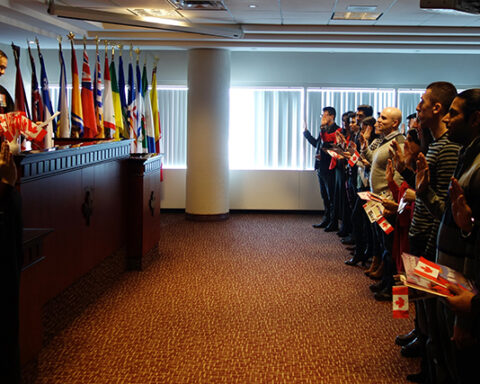The remaining revisions to Canada’s Citizenship laws came into force on June 11, 2015.
Last year the government introduced Bill C-24, the Strengthening Canadian Citizenship Act which introduced many changes to the citizenship application process.
However, many of those were not implemented until just recently.
Most significantly the eligibility period for citizenship has increased and residency requirements have been defined to a strict physical presence in Canada.
Processing times are slated to be sped up dramatically meaning that even with a longer eligibility period, applicants will still become citizens more quickly.
Prospective citizens must also be resident in Canada for tax purposes and demonstrate that they meet their personal income tax obligations.
Processing times are slated to be sped up dramatically meaning that even with a longer eligibility period, applicants will still become citizens more quickly. Let’s look at some of the key changes.
Major Changes
Residency is now defined. Previous legislation did not define residency and in some cases people could become citizens having spent little time in Canada.
The new legislation makes it clear that applicants must be physically present in Canada for four years (1460 days) within a six year period.
Applicants must also be present in Canada for 183 days in each of those six years such that they are residents of Canada for tax purposes and will need to provide proof of CRA filing such as Notices of Assessments.
Future Canadian citizens have responsibilities that they must be willing to embrace.
Applicants must also declare their intention to live in Canada once they become citizens. Furthermore, all applicants between the ages of 14 – 64 must be able to pass a knowledge test and demonstrate language proficiency.
‘Citizenship is Not a Right’
The message is clear – citizenship is not a right that one can acquire with merely the passage of time. Future Canadian citizens have responsibilities that they must be willing to embrace.
Citizenship will be automatically restored to “lost Canadians” who were born before 1947 and were precluded from becoming citizens in accordance with the provisions of Canada’s first Citizenship Act on January 1, 1947.
The penalties for committing misrepresentation or fraud in the application process have increased dramatically.
These corrective measures will also apply to their first generation children who are born outside of Canada.
The penalties for committing misrepresentation or fraud in the application process have increased dramatically. The previous penalty for citizenship fraud was a fine of up to $1000 and/or up to one year in jail.
The new penalties are a fine of up to $100,000 and/or five years in jail for an indictable offence and for a summary sentence, a fine of up to $50,000 and/or two years in jail. In addition, if an applicant is refused for misrepresentation or fraud, the applicant is barred from re-applying for citizenship for a period of five years.
The new legislation also clarifies who can charge a fee to assist in the preparation of a citizenship application. Only a Canadian lawyer or notary, licensed with a law society in a province or territory in Canada or an immigration consultant licensed by the Immigration Consultants of Canada Regulatory Council (ICCRC) is lawfully permitted to prepare and submit a citizenship application for a fee.
This applies whether the immigration professional is inside or outside of Canada.
Catherine Sas, Q.C. has over 25 years of legal experience. She provides a full range of immigration services and is a leading immigration practitioner (Lexpert, Who’s Who Legal, Best Lawyers in Canada). Go to www.canadian-visa-lawyer.com or email [email protected].
Published in Partnership with Asian Pacific Post.





